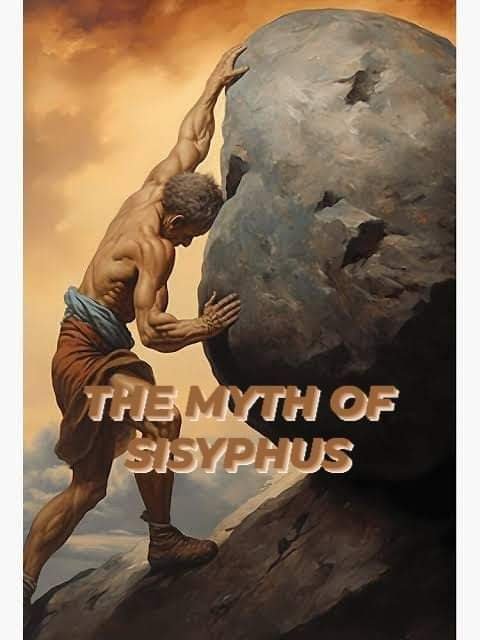#literature
The Myth of Sisyphus.
The Myth of Sisyphus is an essay by the French philosopher Albert Camus, published in 1942.
It explores existentialism and absurdism, focusing on the life of Sisyphus, a figure from Greek mythology condemned to roll a boulder up a hill only for it to roll back down each time he reaches the top. This eternal struggle serves as a metaphor for human existence.
Camus begins by examining the nature of the absurd, which arises from the conflict between humans’ desire for meaning and the indifferent universe. He argues that traditional philosophical perspectives fail to account for the absurdity of life. Instead of seeking meaning through religion or existential philosophies, Camus suggests embracing the absurd condition of human existence. The struggle against the absurd becomes a form of defiance, a recognition of life’s inherent meaninglessness while still finding value in the struggle itself.
The character of Sisyphus symbolises the human condition. Condemned to a futile task, Sisyphus epitomises the absurd hero. However, rather than succumbing to despair, Sisyphus persists in his labour. Camus famously concludes that “one must imagine Sisyphus happy.” This statement underscores the notion that true fulfillment comes from embracing one’s fate and continuing to push the boulder despite its inevitable fall. Sisyphus’s perseverance serves as a testament to human resilience and the ability to find joy in the struggle.
Camus also contrasts Sisyphus’s situation with the human quest for meaning. He asserts that individuals often seek solace in hopes of achieving ultimate understanding or happiness. However, the acceptance of the absurd leads to a more profound appreciation of existence itself. By acknowledging the lack of inherent meaning, individuals can live authentically and fully in the present, rather than being consumed by despair over the unattainable.
The essay emphasises the importance of rebellion in the face of absurdity. This rebellion is not a futile resistance but rather an affirmation of life. By continuing to fight against the absurd, individuals assert their existence and dignity. Camus argues that this rebellion against meaninglessness is essential for a fulfilling life, as it allows people to create their own values and meanings in a universe devoid of them.
The Myth of Sisyphus challenges readers to confront the absurdity of life and find purpose in their struggles. Camus encourages individuals to embrace their fate, find joy in their struggles, and create meaning through their actions, regardless of the universe’s inherent indifference.

